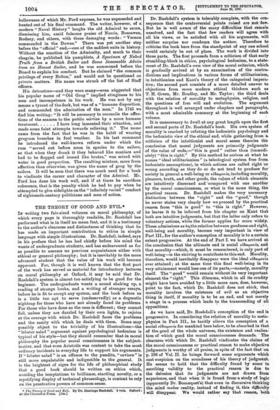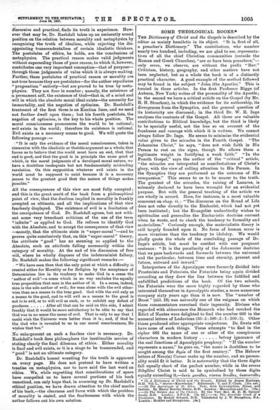THE THEORY OE GOOD AND EVIL.*
IN writing two fair-sized volumes on moral philosophy, of which every page is thoroughly readable, Dr. Rashdall has performed what is in itself no mean feat, and it is a testimony to the author's clearness and distinctness of thinking that he has made an important contribution to ethics in simple language with simple illustrations. Dr. Rashdall, indeed, says in his preface that he has had chiefly before his mind the wants of undergraduate students, and has endeavoured as far as possible to assume no previous acquaintance either with ethical or general philosophy ; but it is inevitably to the more advanced student that the value of his work will become apparent. For, though it is well known that the first part of the work has served as material for introductory lectures on moral philosophy at Oxford, it may be said that Dr. Rashdall's system is almost too satisfying to be good for the beginner. The undergraduate wants a sound shaking up, a reading of strange books, and a writing of stranger essays, before he is fit to accept any system, and the book before us is a little too apt to serve (undeservedly) as a dogmatic nightcap for those who have not already faced its problems. For those who have done so the case is different; they cannot fail, unless they are dazzled by their own lights, to rejoice at the courage with which Dr. Rashdall faces the problems and the sanity with which he deals with them. Some may possibly object to the triviality of his illustrations—the "lobster salad" argument against psychological hedonism is typical of his style—but they should remember that in moral philosophy the popular moral consciousness is the subject. matter, and that even Aristotle was content to take the most ordinary incidents in everyday life to support his arguments. If "lobster salad" is an offence to the pundits, "caviare" is still more unpalatable and indigestible to the general. It is the brightest of signs for the life of philosophical study that a good book should be written on ethics which, avoiding the temptations to brilliance, startling novelty, or a mystifying display of technical phraseology, is content to rely on the penetrative powers of common-sense.
• Th, Th.ry of Good and Roil. By Dr. Hastings }lambda. 2 vols. Osiord, at ties Clarendon Pres.
Dr. Raslidall's system is tolerably complete, with the con. sequence that the controversial points raised are not 'few, But he is well aware of the many difficulties that remain unsolved, and the fact that few readers will agree with all his views, or be satisfied with all his arguments, will neither surprise nor condemn the author. Therefore to criticise the book here from the standpoint of any one school would certainly be out of place. The work is divided into three parts. The first proceeds from a criticism of that early stumbling-block in ethics, psychological hedonism, to a state-
ment of Dr. Rashdall's own view of the moral criterion, which is gradually arrived at by an examination of the contra. dictions and implications in various forms of utilitarianism, in intuitionism and Kant's theory of the categorical impera- tive; the second part consists of a more detailed answer to objections from more modern ethical thinkers such as T. H. Green, Mr. Bradley, and Mr. Taylor ; the third deals with the relation of morality to metaphysics, religion, and the questions of free will and evolution. The argument throughout is well arranged under chapters and paragraphs, with a most admirable summary at the beginning of each volume.
It is unnecessary to dwell at any great length upon the fret and second parts of Dr. Rashdall's book. His own system of morality is reached by refuting the hedonistic psychology and the hedonistic view of the ethical end, while gathering from -a criticism of the intuitionist and moral sense theories the conclusion that moral judgments are primarily judgments of the value of ends,—" this is good" rather than (immedi- ately) "this is right." By this method he arrives at what he names "ideal utilitarianism" (a teleological system free from hedonistic assumptions), in which actions are called right 'or wrong according as they do or do not tend to produce' for society in general a well-being or riantirovia, including morality, pleasure, truth, and other goods, the values of which elements are intuitively discerned and 'compared with one another by the moral consciousness, or what is the same thing, the practical reason. Dr. Rashdall makes the very necessary distinction between the "right" and the "good," though he never states very clearly how we proceed by the practical reason from "this is good" to "this is right." However, he leaves it to be inferred from his chapter on Kant that both are intuitive judgments, but that the latter only refers to voluntary actions, while the former applies far more widely. These admissions as to,the relation between goodness and right, well-being and morality, become very important in view of Part III., for the author's conception of morality is to a certain extent progressive. At the end of Part I. we have arrived at the conclusion that the ultimate end is social vettamosia, and that morality—which, it must be remembered, is only part of well-being—is the striving to contribute to this end. Morality, therefore, would inevitably disappear were the ideal feaapacia ever attained ; at the same time this final well-being in its very attainment would lose one of its parts,—namely, morality itself. The "good" would remain without its very important element the "right." This dilemma, which in all its crudity might have been avoided by a little more care, does, however, point to the fact, which Dr. Rashdall does not shirk, that morality involves the existence of evil as an objective thing in itself, if morality is to be an end, and not merely a stage in .a process which leads to the transcending of all oppositions.
As we have said, Dr. Rashdall's conception of- end is progressive. In considering the relation of moraliy to meta- physics in Part III, he tacitly allows the conception of a social 65siaocia for mankind here below, to be absorbed in that of the good of the whole universe, the existence and realise.' tion of which good the moral consciousness demands. The clearness with which Dr. Rashdall vindicates the claims of the moral consciousness or practical reason to make objective judgments is worthy of all praise, in spite of the fact that 'on p. 198 of Vol. IL he brings forward some arguments 'which cast suspicion on the soundness of his theory of judgment. He seems to hold 'that the difficulty found by some in ascribing validity to' the practical reason is due to the delusion that its judgments are not drawn from experience, and that when it is found from a study of logic (apparently Dr. Bosanquet's) that even in discursive thinking the mind snakes reality, instead of finding it, this diffienify will disappear. We would rather say that reason, both
discursive and practical, finds its truth in experience. How- ever that may be, Dr. Rashdall takes up an eminently sound position on the relation between morality and metaphysics by recognising the truth of idealism, while rejecting the dis- appointing transcendentalism of certain idealistic thinkers. The postulates of ethics, he holds, are the 'eonclusiona of metaphysics. The practical reason makes valid judgments without superseding those of pure reason, to which it, however, contributes one very important conception—that of purpose— through those judgments of value which it is always making. Further, these postulates of practical reason or morality are not true because they are postulates—for the author repudiates " pragmatism " entirely—but are proved to be true by meta- physics. They are four in number ; namely, the existence of n permanent self, the existence of God—that is, of a mind and will in which the absolute moral ideal exists—the necessity for immortality, and the negation of optimism. Dr. Rashdall's treatment of the first three is on Kantian lines, and we need not further dwell upon them ; but his fourth postulate, the negation of optimism, is the key to his whole position. The moral consciousness pronounces the world to be rational; evil exists in the world; therefore its existence is rational. Evil exists as a necessary means to good. We will quote the following passage :—
, "It is only the evidence of the moral consciousness, taken in cbnnexion with the idealistic or theistic argument as a whole, that forces us to believe that the world must have an end, that that end is good, and that the good is in principle the same good of which, in the moral judgments of- a developed moral nature, we have a doubtless inadequate but not fundamentally misleading revelation. On this supposition whatever evil exists in the ‘.world. must be supposed to exist because it is a necessary means to the greatest good that the nature of things makes possible."
All the consequences of this view are most fully accepted ; and this is the great merit of the book from a philosophimil point of view, that the dualism implied in morality is frankly accepted as ultimate, and all the implications of that view fearlessly displaye(1. The existence of evil is a limitation of the omnipotence of God. Dr. Rashdall agrees, but not with- out some very trenchant criticism of the use of the term "infinite" as applied to God. He refuses to identify God with the Absolute, and to accept the consequence of that view —namely, that the ultimate state is "super-moral"—and he proves quite conclusively that, on this " super-moral " theory, the attribute "good" has no meaning as applied to the Absolute, such an attribute falling necessarily within the category of morality. At the end of his .discussion of free will, where he wholly disposes of the indeterminist fallacy, Dr. Rashclall makes the following significant remarks "We have seen then that the only point at which a difficulty is created either for Morality or for Religion by the acceptance of Determinism lies in its tendency to make God in a sense the 'author of evil '—a sense which in no way excludes the equally true proposition that man is the author of it. In a sense, indeed, man is the sole author of evil; for man alone wills the evil other- wise than as a means to the true good. God wills the evil only as a means to the good, and to will evil as a means to the good is not to be evil, or to will evil as such, or to exhibit any defect of goodness After all that can be said on this side, I admit frankly that it would be more satisfactory to be able to say that God was in no sense the cause of evil. That is only to say that I could wish the Universe were better than it is ; and, if God be the God who is revealed to us in our moral consciousness, He wishes that too."
No enlargement on such a fearless view is necessary. Dr. Rushdall's book does philosophers the inestimable service of stating clearly the final dilemma of ethics. , Either morality is final and evil exists, or it is a stage to be transcended, and " good" is not an ultimate category.
Dr. Raslidall's honest wrestling for the truth is apparent on every page. He does not pretend to have written a treatise on metaphysics, nor to have said the last word on ethics. , We, while regretting that considerations of space have compelled us to leave several portions of his book unnoticed, can only hope that, in summing up Dr. Rashdalrs ethical ,position, we have drawn attention to the chief merits of his book,—the clearness and force with which the problem of morality is stated, and the fearlessness with which the author follows out his own solution.

















































 Previous page
Previous page